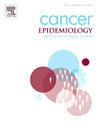黑人男性维生素d相关基因变异与前列腺癌风险
IF 2.4
3区 医学
Q3 ONCOLOGY
引用次数: 0
摘要
背景:维生素D与前列腺癌之间的关系主要是在白人男性中发现的。然而,黑人男性的前列腺癌发病率和死亡率更高,循环维生素D水平长期较低,维生素D相关基因的遗传变异与祖先有关。在这里,我们研究了黑人男性中维生素D通路和前列腺癌风险的关键基因。方法:我们评估了总共73个候选基因变异(即GC、CYP27A1、CYP27B1、CYP24A1、VDR和RXRA),包括先前与白人男性前列腺癌和循环25(OHD)相关的功能变异。研究人员使用全基因组关联研究数据,对黑人男性中大约1万例前列腺癌病例和1万例对照,以及白人男性中超过8.5万例和9.1万例对照进行对比,研究了与前列腺癌风险的关联。统计显著性阈值为0.000685,用于解释测试的73个变体。结果:经过多次比较调整后,没有一种变异与黑人男性前列腺癌风险显著相关。结论:我们观察到RXRA和VDR基因变异与黑人男性前列腺癌风险之间的相关性。未来探索黑人男性维生素D与癌症风险关系的研究将需要更大的样本量,以确定与该人群风险相关的遗传特异性变异。本文章由计算机程序翻译,如有差异,请以英文原文为准。
Vitamin D-related genetic variants and prostate cancer risk in Black men
Background
The relationship between vitamin D and prostate cancer has primarily been characterized among White men. Black men, however, have higher prostate cancer incidence and mortality rates, chronically low circulating vitamin D levels, and ancestry-specific genetic variants in vitamin D-related genes. Here, we examine critical genes in the vitamin D pathway and prostate cancer risk in Black men.
Methods
We assessed a total of 73 candidate variants in genes (namely GC, CYP27A1, CYP27B1, CYP24A1, VDR, and RXRA) including functional variants previously associated with prostate cancer and circulating 25(OHD) in White men. Associations with prostate cancer risk were examined using genome-wide association study data for approximately 10,000 prostate cancer cases and 10,000 controls among Black men and over 85,000 cases and 91,000 controls among White men for comparison. A statistical significance threshold of 0.000685 was used to account for the 73 variants tested.
Results
None of the variants examined were significantly associated with prostate cancer risk among Black men after multiple comparison adjustment. Suggestive associations (P < 0.05) for four variants were found in Black men, including two in RXRA (rs41400444 OR=1.09, 95 % CI: 1.01–1.17, P = 0.024 and rs10881574 OR = 0.93, 0.87–1.00, P = 0.046) and two in VDR (rs2853563 OR = 1.07, 1.01–1.13, P = 0.017 and rs1156882 OR = 1.06, 1.00–1.12, P = 0.045). Two variants in VDR were also positively associated with risk in White men (rs11568820 OR = 1.04, 1.02–1.06, P = 0.00024 and rs4516035 OR = 1.03, 1.01–1.04, P = 0.00055).
Conclusion
We observed suggestive associations between genetic variants in RXRA and VDR and prostate cancer risk in Black men. Future research exploring the relationship of vitamin D with cancer risk in Black men will need larger sample sizes to identify ancestry-specific variants relevant to risk in this population.
求助全文
通过发布文献求助,成功后即可免费获取论文全文。
去求助
来源期刊

Cancer Epidemiology
医学-肿瘤学
CiteScore
4.50
自引率
3.80%
发文量
200
审稿时长
39 days
期刊介绍:
Cancer Epidemiology is dedicated to increasing understanding about cancer causes, prevention and control. The scope of the journal embraces all aspects of cancer epidemiology including:
• Descriptive epidemiology
• Studies of risk factors for disease initiation, development and prognosis
• Screening and early detection
• Prevention and control
• Methodological issues
The journal publishes original research articles (full length and short reports), systematic reviews and meta-analyses, editorials, commentaries and letters to the editor commenting on previously published research.
 求助内容:
求助内容: 应助结果提醒方式:
应助结果提醒方式:


